Acting Student and Bioengineering Alumna Awarded Soros Fellowship for New Americans
Awards & Accolades
By:
Published Date
By:
Share This:
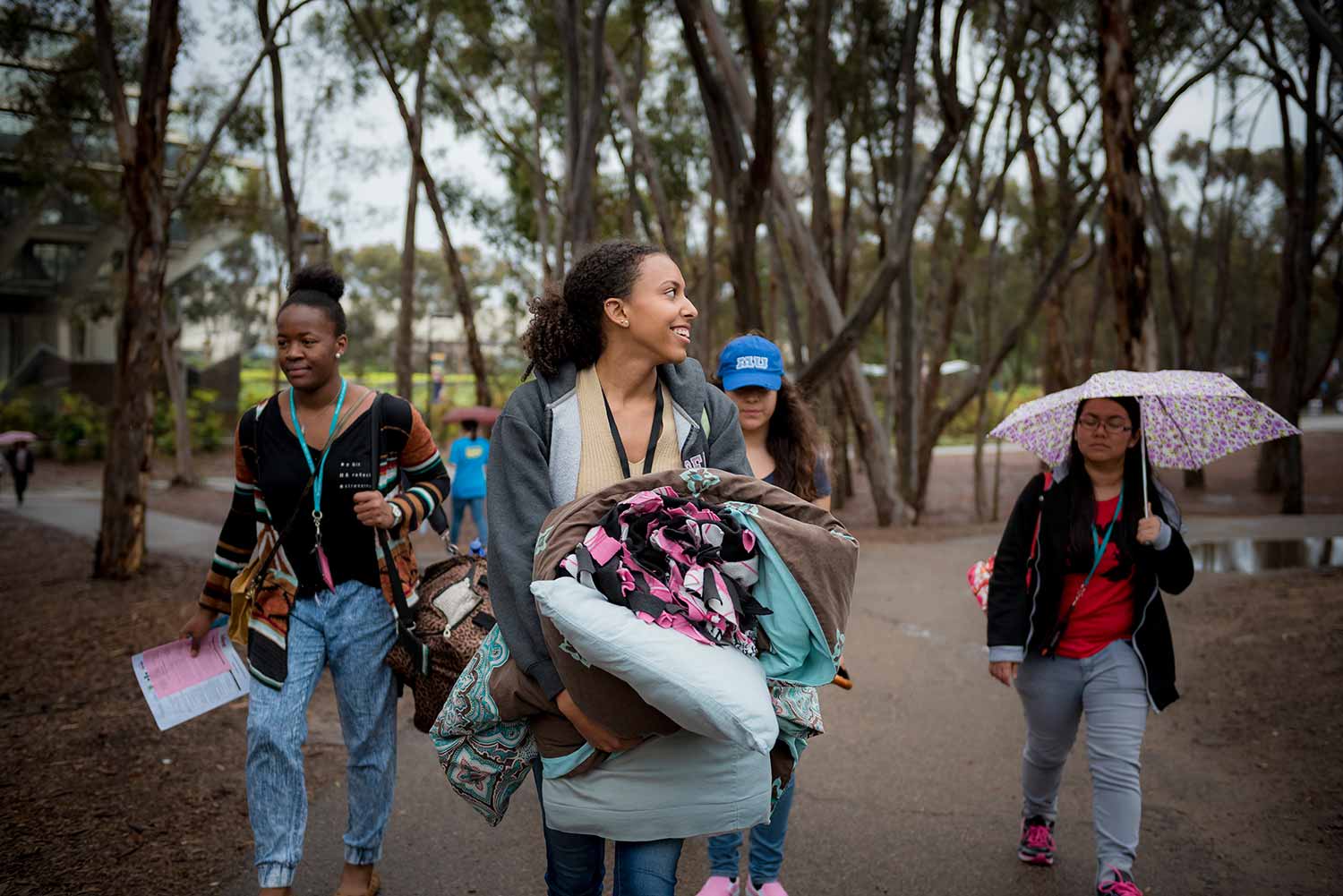
Photos by Alethea Go/UC San Diego Publications
It was a drizzly Thursday afternoon when they began to arrive with pillows, sleeping bags and suitcases in hand. Yet the wet weather did little to temper the enthusiasm of the 244 high school students who traveled to UC San Diego from across the state to take part in an overnight program designed to introduce historically underrepresented students to college life.
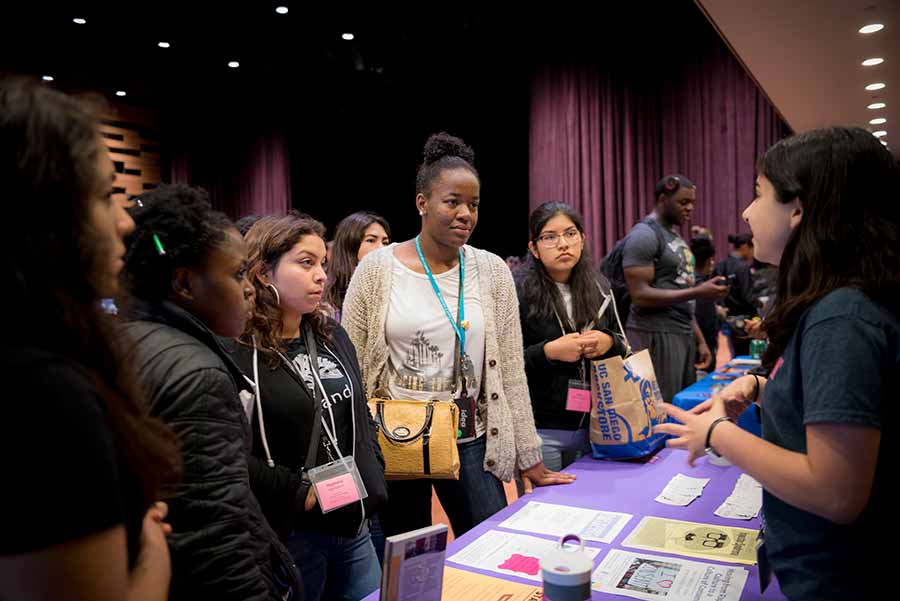
After getting settled in their respective dorms, participants set out across campus with their college student hosts, who gave them insider tips on everything from which market has the tastiest ice cream to the best places to study and how to catch the campus shuttle. Throughout the program, they learned about campus resources, formed a network of friends and advisors and attended workshops focused on student empowerment and multiculturalism.
“The overnight program seemed like it would be fun, so I applied,” explained Jacob Martinez, a high school student from Hemet, Calif. who took part in the program. “I really wanted it to help me make my choice, and it has; UC San Diego is now my priority.”
The free, invitation-only program was held April 7-9 leading up to Triton Day. The overnights were led jointly by UC San Diego’s Student Promoted Access Center for Education and Service (SPACES), the campus Black Resource Center and the Jacobs School of Engineering’s IDEA Student Center. The goal of the program is to offer admitted high school students—in particular those from historically underrepresented backgrounds and first-generation college students—the chance to immerse themselves in a university environment.
“The Overnight Programs are a great opportunity for us to welcome diverse admitted students to UC San Diego and affirm our personal commitment to their success,” said Vice Chancellor for Equity, Diversity and Inclusion Becky Petitt.
Students had the opportunity to enroll in one of three tracks, which included the Student-Initiated Access Programs and Services (SIAPS), Black Student Union (BSU) and IDEA Student Center. All participants had the opportunity to stay in the dorms over the two-night, three-day program as well as eat at campus dining halls and attend mock lectures, just like a college student would. Many other activities overlapped, such as workshops on academic success, seminars on financial aid and community building sessions exploring diversity and social justice topics.
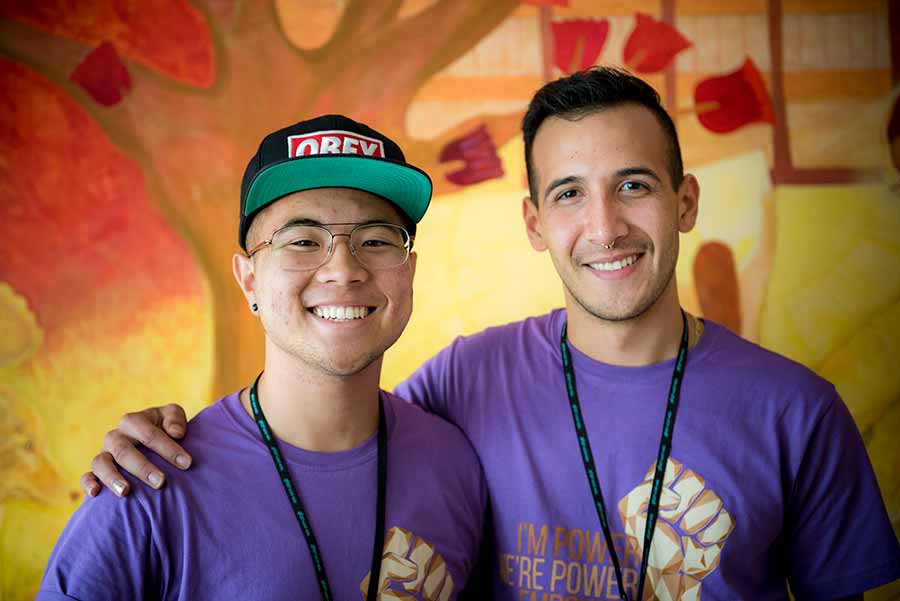
From left to right: Paolo Esguerra and Miguel Angel Anzelmetti
High school students journeyed from the Bay area, Los Angeles, Inland Empire and locally around San Diego. For those traveling from Northern California, Southwest Airlines generously donated 50 roundtrip tickets to bring select students to Triton Day activities, with the majority of tickets used for overnight participants. Much of the programming was organized by students. Both Miguel Angel Anzelmetti and Paolo Esguerra, Overnight Program Coordinators and juniors at UC San Diego, served as student hosts before transitioning into their leadership roles this year.
“I have been a host for the past two years and I was an overnight student also in the SIAPS track,” said Anzelmetti. “When I first came here, I saw the leaders and thought, I want to do that someday! I like doing this type of work. I come from a background that doesn’t really push education, so it’s nice to give back. I know where students are coming from because I’m from that community.”
Added Esguerra, “What I enjoy most is knowing that you could potentially influence someone’s decision to come to UC San Diego. Facilitating this kind of community building is what makes me really excited, watching people learn from the workshops and taking something away from the experience.”
Each of the high school students in the overnight program were matched with a current student based on five criteria, ranked by priority by the participant, including major, gender or sexual identity, college, ethnicity and hometown. The goal was to provide not only a point of contact, but also a friend and familiar face throughout their stay. Hosts shared important insight into college life, such as the importance of self-care to maintain physical and emotional health, as well as choosing a major and life path that truly reflects their passions.
“I wanted to learn more about the black community at UC San Diego, as well as figure out if I could call this place home for the next four years,” said Sarah Griffiths, who is from San Jose, Calif. and took part in the BSU track. “I like all of the different resource centers they have here for every different type of person. It has a very welcoming feel. Something really nice my host did for me was introduce me to her friends and really made me a part of her circle. I feel like if I were to come here I would know people and would feel comfortable.”
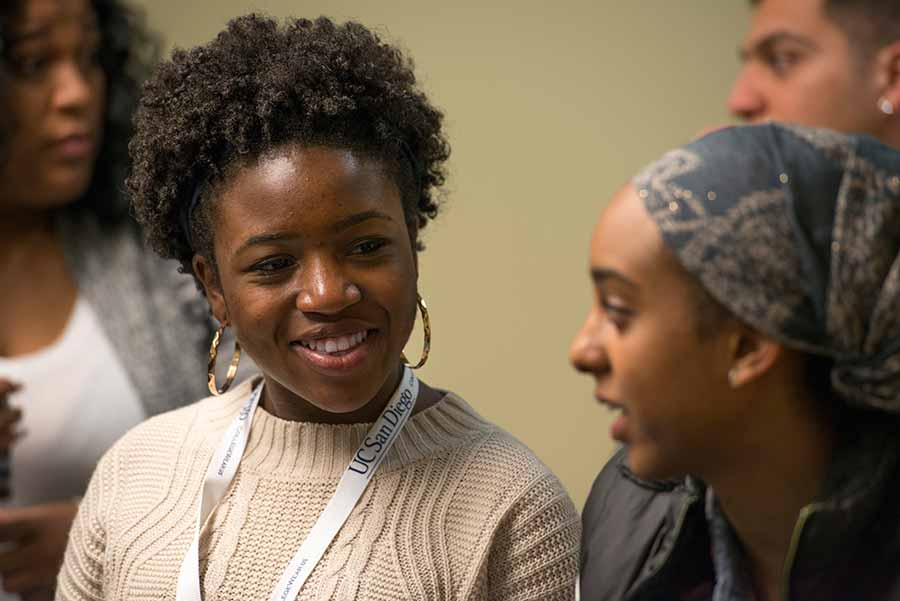
Sarah Griffiths, left
Throughout the program the prospective students were invited to attend a series of workshops to explore identities and build community, hosted by the Raza Resource Centro, LGBT Resource Center and other campus partners. Discussions included, “Harmful Ideals of Beauty,” an interactive seminar to talk about skin color, weight, self-esteem and other topics surrounding the idea of beauty; “The ‘So’ in Social Justice,” a workshop covering the fundamentals of social justice; and a student panel at the Raza Resource Centro, where five undergraduates discussed what it’s like to be Latino/a and Chicano/a in higher education.
High school students also had the chance to talk with faculty and tour laboratories, an important factor for many when deciding which major to pursue. Seeing the laboratory was a highlight for Gavin Ferguson, an aspiring aerospace engineer from Palm Springs, Calif who took part in the IDEA Center engineering track. “We got to do a scavenger hunt; at each spot we found a tool and had to build a catapult out of sticks, rubber bands, a clip and some glue…then we had a competition. It was fun!”
There was plenty of time for socializing during their stay, too. Jacob Martinez volunteered to be hypnotized on stage during the carnival for SIAPS track participants, and ended up singing a Justin Bieber song, flying in an airplane and betting on horses. It was surely a way to quickly make friends—many students approached him after the show.
“The best part has been meeting everybody,” said Martinez. “My dorm mates are such cool guys, I felt at home immediately—I’m ready to move in now!”
The Overnight Program is just one of a series of recruitment efforts that happen each spring at UC San Diego to welcome admitted students and encourage each to sign their Statement of Intent to Register (SIR). Many students, staff, faculty, alumni volunteers and local community members dedicate their time to connecting with prospective students and families during this critical decision making time.
This year, members of the Chancellor’s Community Advisory Board (CCAB) have been playing a larger role in recruitment efforts. The group of 27 community ambassadors helps to strengthen relationships with local organizations and increase visibility of the positive impact of UC San Diego.
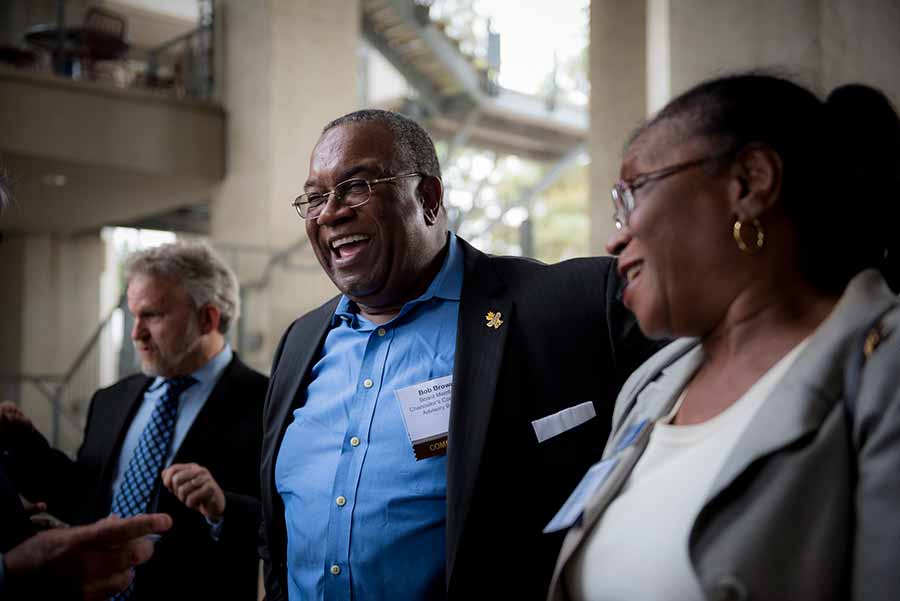
Bob Brown
Bob Brown, Ph.D., chair of CCAB, enjoyed taking part in the Early Calling Campaign, a program to inform students of their acceptance to UC San Diego before they receive their official letter in the mail. “When I call the students to tell them they have been accepted, many are skeptical and ask me—‘are you sure?’ For a lot of students it is a dream fulfilled, especially for those who will be the first in their family to attend college.”
In addition, Brown and other CCAB members, as well as numerous alumni volunteers, have traveled to Los Angeles, Oakland and Inland Empire to welcome newly admitted students who are from low socio-economic backgrounds. They serve as a resource and converse with prospective students and their families to answer any questions they may have about the university.
“Chancellor Khosla is fully committed to ensuring UC San Diego’s student population reflects the diversity of our community and world,” said Brown. “If students and parents can’t come to campus, we go to them. We want them here, and make a sincere effort to reach out and be available.”
Share This:
Keep up with all the latest from UC San Diego. Subscribe to the newsletter today.